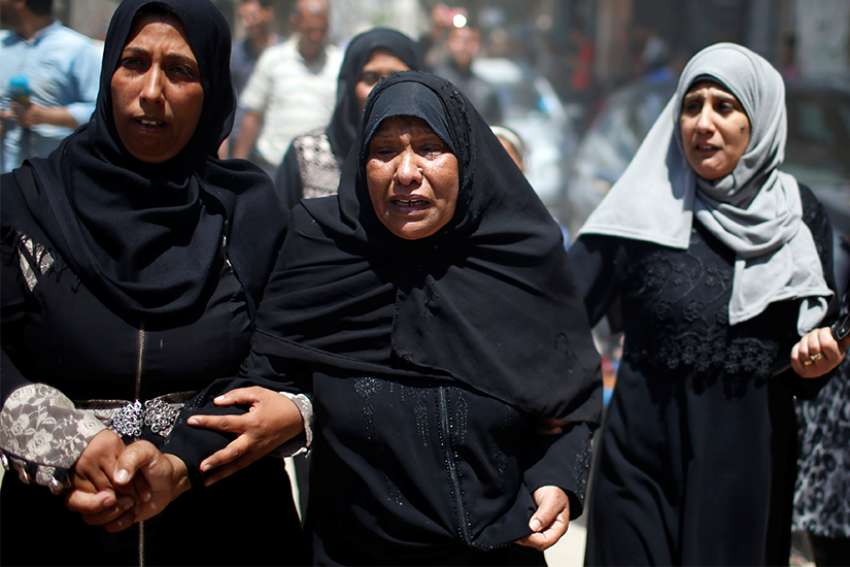Pope Francis deplored the violence and urged Catholics to pray for peace in the Holy Land after up to 40,000 Palestinians massed on the fenced border May 14, prompting intense teargas and sniper fire from Israeli positions.
“I am very worried about the intensifying tensions in the Holy Land and the Middle East and about the spiral of violence that increasingly leads away from the path of peace, dialogue and negotiations,” the Pope said May 16.
Among the wounded was Canadian-Palestinian emergency-room clinician Dr. Tarek Loubani, shot twice in the legs.
Loubani’s injuries prompted Prime Minister Justin Trudeau to call for an international, third-party investigation into circumstances that have led to injuries to “so many unarmed people, including civilians.”
The United States blocked a motion at the UN Security Council that would have initiated an investigation, but experts in international law predict the International Criminal Court or the UN Human Rights Council are likely to investigate.
“I would like to see a recognition of the terrible complexity of the situation,” said Toronto Rabbi Baruch Frydman-Kohl, who has deep family connections to Israel and has led interfaith pilgrimages in the region. “Gazans feel they don’t have a lot of alternatives. And Hamas has carefully orchestrated events. At the same time, Israelis feel terribly conflicted about the need to protect their border with the recognition that they really wish that there were a way, that there were ways, to do it that are not lethal. It’s a terrible moral predicament.”
The Catholic Near East Welfare Association (CNEWA), which supports humanitarian work and institutions inside Gaza, is urging Canadian Catholics to learn more about life inside Gaza.
“Let’s not be surprised to see the Gazan population going to the wall to demonstrate their anger and the fact that they can no longer live under those conditions,” said CNEWA Canada executive director Carl Hétu. “That’s why they are there. There is no justification whatever possible that can be used to justify shooting unarmed civilians.”
The Catholic population of Gaza has shrunk from about 3,000 in 2006 to 1,100 today, but CNEWA continues to support Christian institutions, including the Anglican hospital in Gaza City, as the Israeli blockade has caused shortages of everything from gasoline to food. On Hétu’s most recent trip to Gaza with an international delegation of Catholic bishops, young Gazans told the bishops about their frustration and despair.
“Many told us they have absolutely no future in Gaza — no work. They don’t see how they can even live there,” Hétu said.
The May 14 protest along the border was the culmination of a month-long campaign of protests called “The Great March of Return.” More than 100 people have died since the protest began. Protesters were demanding the right to return to villages and homes their families were forced from or abandoned during the 1948 war that ended in the partition of Israel and Palestine. More than half of Gaza’s residents are refugees or the decendants of refugees.
The protests became more intense as the U.S. officially moved its embassy in Israel from Tel Aviv to Jerusalem. Protesters also demanded an end to Israel’s blockade, under which only Israeli-approved-and-inspected shipments of goods may enter Gaza.
Basilian Fr. Bob Holmes leads annual “Peace and Justice Pilgrimages” to Israel and the West Bank. He has tried twice to visit Gaza but has been denied permission.
Holmes rejects the Israeli government’s contention that the Gaza protests are co-ordinated by a terrorist-run Hamas government in Gaza as a means of getting militants and assassins across the border.
“They’re saying Hamas is behind it. No. It is a popular protest. Hamas has gone along with it, but they didn’t instigate it,” he said.
The real hope for peace has to come from building up institutions and opportunities for Palestinians to live a dignified life, said Hétu.
“Even though Christians in the Palestinian territories, including Gaza, represent about 1.5 per cent of the population, they provide about 45 per cent of all social services,” said Hétu. “Our role is to work with those institutions.”
Violence on Israel-Gaza border prompts calls for prayers, dialogue and investigation
By Michael Swan, The Catholic RegisterWith at least 60 killed and over 2,700 injured, Canadian Catholics can’t just shrug and say the violence on the Israel-Gaza border is not their problem.
Please support The Catholic Register
Unlike many media companies, The Catholic Register has never charged readers for access to the news and information on our website. We want to keep our award-winning journalism as widely available as possible. But we need your help.
For more than 125 years, The Register has been a trusted source of faith-based journalism. By making even a small donation you help ensure our future as an important voice in the Catholic Church. If you support the mission of Catholic journalism, please donate today. Thank you.
DONATE

